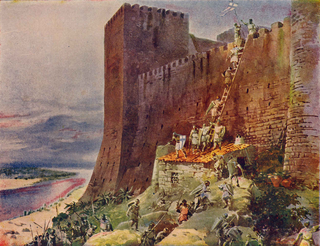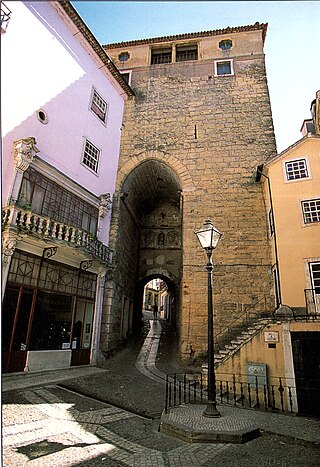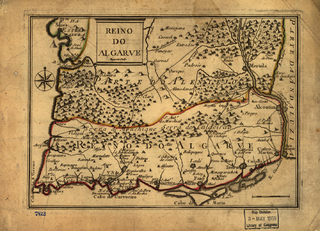
Afonso II, nicknamed the Fat or the Leper, was the third king of Portugal and the second but eldest surviving son of Sancho I of Portugal and Dulce of Aragon. Afonso succeeded his father on 27 March 1211.

Afonso III, called the Boulonnais, was King of Portugal and the first to use the title King of Portugal and the Algarve, from 1249. He was the second son of King Afonso II of Portugal and his wife, Urraca of Castile; he succeeded his brother, King Sancho II of Portugal, who died on 4 January 1248.

The Reconquista or the reconquest of al-Andalus was a series of military and cultural campaigns that European Christian kingdoms waged against the Muslim kingdoms following the Muslim conquest of the Iberian Peninsula by the Umayyad Caliphate, culminating in the reign of the Catholic Monarchs of Spain. The beginning of the Reconquista is traditionally dated to the Battle of Covadonga, in which an Asturian army achieved the first Christian victory over the forces of the Umayyad Caliphate since the beginning of the military invasion. The Reconquista ended in 1492 with the fall of the Nasrid kingdom of Granada to the Catholic Monarchs.

Faro is a municipality, the southernmost city and capital of the district of the same name, in the Algarve region of southern Portugal. With an estimated population of 67,566 inhabitants in 2021, the municipality covers an area of about 202.57 km2 (78.21 sq mi).
The municipalities of Faro-Olhão-Loulé due to its adjacency, sharing of infrastructures and regular commute can be considered an intermunicipal community with a population of 184,578 inhabitants (2021). A Metro connecting this community is planned to be finished by 2029.

The Kingdom of the Algarve, after 1471, Kingdom of the Algarves, was a nominal kingdom within the Kingdom of Portugal, located in the southernmost region of continental Portugal, until the end of the monarchy in 1910.

Loulé is a city and municipality in the region of Algarve, district of Faro, Portugal. In 2021, the population of the entire municipality was 72,373 inhabitants, in an area of approximately 763.67 square kilometres (294.85 sq mi). The municipality has two principal cities: Loulé and Quarteira.
This is a timeline of notable events during the period of Muslim presence in Iberia, starting with the Umayyad conquest in the 8th century.
This is a historical timeline of Portugal.
This is a historical timeline of Portugal.
Gharb al-Andalus, or just al-Gharb, was the name given by the Muslims of Iberia to the region of southern modern-day Portugal and part of West-central modern day Spain during their rule of the territory, from 711 to 1249. This period started with the fall of the Visigothic kingdom after Tariq ibn-Ziyad's invasion of Iberia and the establishment of the Umayyad control in the territory. The present day Algarve derives its name from this Arabic name. The region had a population of about 500,000 people.

Marvão is a municipality in Portalegre District in Portugal. The population in 2020 was 2,972, in an area of 154.90 km2. The present Mayor is Luís Vitorino, elected by the Social Democratic Party. The municipal holiday is September 8.

D. Paio Peres Correia was a Portuguese warrior who played an important role in the thirteenth-century Reconquista.

The conquest of Santarém took place on 15 March 1147, when the troops of the Kingdom of Portugal under the leadership of Afonso I of Portugal captured the Taifa of Badajoz city of Santarém.

The siege of Alcácer do Sal lasted from 30 July to 18 October 1217. The well fortified city of Alcácer do Sal was a frontier outpost of the Almohad Caliphate facing Portugal. It was besieged by forces from Portugal, León, the military orders and the Fifth Crusade. The latter were led by Count William I of Holland. The expedition was the brainchild of Bishop Soeiro II of Lisbon, whose diocese was threatened by regular raids from Alcácer. King Afonso II of Portugal did not take part in person, but the city was incorporated into his kingdom after its capitulation. The crusaders who took part in the siege, mainly from the Rhineland and the Low Countries, did so without papal authorization and were afterwards ordered to continue on to the Holy Land.

The siege of Coimbra of 1117 was a military engagement between the forces of the Almoravid dynasty and those of the County of Portugal in the city of Coimbra. In 1117, the Almoravids launched a campaign into the County of Portugal to attack the city of Coimbra and withdrew after failing to capture it.
The Portuguese conquest of the Algarve, the southern-most region in modern-day Portugal, occurred between 1238, when the castle of Estômbar was captured by the Order of Santiago, and 1249, when king Afonso III of Portugal captured Faro, Loulé, Aljezur, Porches and Albufeira.

This chronology presents the timeline of the Reconquista, a series of military and political actions taken following the Muslim conquest of the Iberian Peninsula that began in 711. These Crusades began a decade later with dated to the Battle of Covadonga and its culmination came in 1492 with the Fall of Granada to Isabella I of Castile and Ferdinand II of Aragon. The evolution of the various Iberian kingdoms to the unified kingdoms of Spain and Portugal was key to the conquest of al-Andalus from the Moors.

Portuguese participation in the Reconquista occurred from when the County of Portugal was founded in 868 and continued for 381 years until the last cities still in Muslim control in the Algarve were captured in 1249. Portugal was created during this prolonged process and largely owes its geographic form to it.

The Portuguese–Castillian war of 1250–1253 was a military conflict which involved the Portuguese Crown against the Crown of Castile for possession of the Algarve.
The siege of Santarém in 1171 was a military confrontation during the Reconquista, in which the city of Santarém was besieged by an army from the Almohad Caliphate, but they were unable to conquer the city. It was the first time that Santarém was attacked since its conquest by King Afonso I of Portugal, 24 years earlier.














